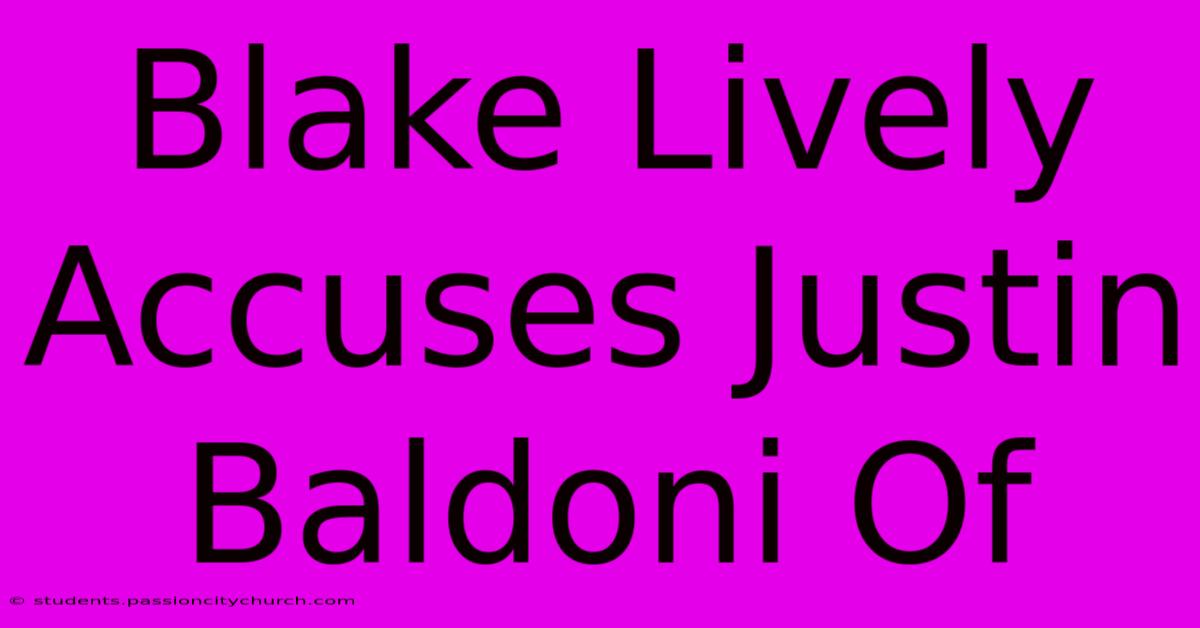Blake Lively Accuses Justin Baldoni Of

Discover more detailed and exciting information on our website. Click the link below to start your adventure: Visit Best Website. Don't miss out!
Table of Contents
Blake Lively Accuses Justin Baldoni Of: Unpacking the Rumors and Speculation
The internet thrives on speculation, and when whispers involve celebrities like Blake Lively and Justin Baldoni, the rumor mill goes into overdrive. While there's no concrete evidence of any serious accusation from Blake Lively against Justin Baldoni, the online chatter necessitates a deep dive into the potential sources of these rumors and the importance of responsible reporting in the age of misinformation. This article will explore the landscape of online speculation surrounding the two actors, examining potential origins and highlighting the ethical considerations involved in spreading unverified claims.
The Absence of Concrete Evidence:
It's crucial to state upfront: there is no publicly available, credible evidence of Blake Lively making any formal accusations against Justin Baldoni. Searches reveal numerous articles and forum discussions referencing this supposed accusation, but these sources often lack primary documentation, relying instead on reposts, conjecture, and speculation. This lack of verifiable evidence strongly suggests the accusations are unfounded and should be treated with extreme skepticism.
Potential Origins of the Rumors:
The origin of these rumors remains shrouded in mystery. Several possibilities exist:
-
Misinterpretation of Interactions: Public appearances, social media interactions, or even seemingly innocuous comments can be misinterpreted and taken out of context by online communities. A brief interaction, a missed greeting, or a perceived slight can be amplified into a full-blown narrative. The inherent ambiguity of online communication often contributes to these misinterpretations.
-
Fabricated Stories: The internet is rife with fabricated stories aimed at generating clicks and engagement. False narratives involving celebrities are unfortunately commonplace, often designed to capitalize on existing fan interest and generate traffic for websites. These fabricated stories frequently lack sources and rely on creating a sense of urgency and intrigue.
-
Conflation with Other Events: Sometimes, rumors might arise from conflating separate incidents or individuals. It's possible that a rumor involving one celebrity might accidentally (or intentionally) get linked with another, creating a false narrative.
-
Social Media Amplification: The rapid spread of information on social media platforms can quickly escalate minor misunderstandings into full-blown controversies. The lack of fact-checking and the often-emotional nature of online discussions contribute to the spread of misinformation.
The Importance of Responsible Reporting:
It's critical to approach celebrity news with a healthy dose of skepticism. Reliable news sources verify information rigorously before publication, relying on multiple credible sources and avoiding conjecture. In contrast, many websites and social media posts thrive on sensationalism, often spreading unverified claims without considering the potential consequences.
The potential harm of spreading unfounded accusations is significant:
-
Damage to Reputation: False accusations can severely damage the reputations of those involved, leading to professional setbacks and personal distress. The long-term impact of such rumors can be devastating.
-
Erosion of Trust: The proliferation of misinformation erodes public trust in news sources and online information in general. When people lose confidence in their ability to discern truth from falsehood, society as a whole suffers.
-
Legal Ramifications: In some instances, spreading false accusations can have serious legal consequences. Defamation lawsuits are a possibility when individuals are falsely accused of wrongdoing.
The Ethical Considerations:
Before sharing or believing any information online, particularly concerning accusations against individuals, consider the following:
-
Source Verification: Always check the credibility of the source. Is it a reputable news outlet with a history of accurate reporting, or is it an anonymous blog or social media post?
-
Evidence Evaluation: Examine the evidence presented. Is there concrete proof to support the claims, or is it based on speculation, hearsay, or assumptions?
-
Contextual Understanding: Consider the context of any interactions or comments. Was information taken out of context? Were any relevant details omitted?
-
Impact Assessment: Think about the potential impact of sharing the information. Could it harm the reputation or well-being of those involved?
Conclusion:
The rumors surrounding a supposed accusation by Blake Lively against Justin Baldoni lack substantial evidence. The absence of verifiable information suggests these claims are likely unfounded. This situation serves as a powerful reminder of the importance of critical thinking and responsible reporting in the digital age. Before sharing information online, take the time to verify its accuracy and consider the potential consequences of spreading misinformation. Responsible online behavior is crucial in maintaining a healthy and informed society. Remember, the absence of evidence is not evidence of absence, but the lack of credible, verifiable evidence strongly suggests that these rumours should be treated as unfounded until proven otherwise.

Thank you for visiting our website wich cover about Blake Lively Accuses Justin Baldoni Of. We hope the information provided has been useful to you. Feel free to contact us if you have any questions or need further assistance. See you next time and dont miss to bookmark.
Also read the following articles
| Article Title | Date |
|---|---|
| Aston Villa Derrota Al Manchester City | Dec 22, 2024 |
| Hall Of Famer Rickey Henderson Dead | Dec 22, 2024 |
| Onde Ver Palace X Arsenal Provaveis Escalacoes | Dec 22, 2024 |
| Mahomes Chiefs Edge Another Close Win | Dec 22, 2024 |
| Nfl News Tank Dells Serious Knee Injury | Dec 22, 2024 |
| Chiefs Win 27 19 Against Texans Game Recap | Dec 22, 2024 |
| Barcelona Vs Atletico Canais E Horario Do Jogo | Dec 22, 2024 |
| Lively And Baldoni Post Film Controversy | Dec 22, 2024 |
| Rickey Henderson Unbreakable Leadoff Record | Dec 22, 2024 |
| Atletico Vs Barcelona Resumen Del Partido | Dec 22, 2024 |
